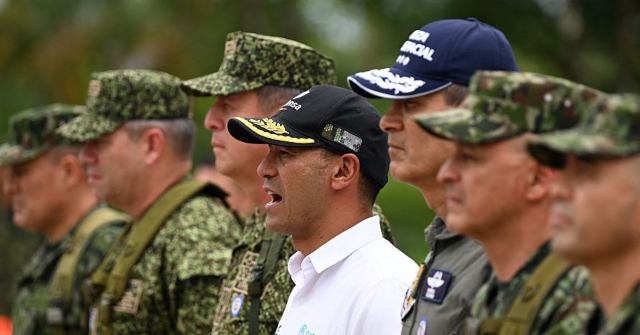The Colombian Army announced on Sunday that 45 military officials were kidnapped during a security operation in a known drug trafficking route in the Department (state) of Cauca. The kidnappers were over 600 individuals from communities “in collusion” with the Revolutionary Armed Forces of Colombia (FARC) Marxist terrorist group.
A statement from the Colombian Army said the 45 officials were kidnapped on Sunday afternoon while conducting a military operation at the Micay Canyon, a river in the Western Colombian department of Cauca that drains into the Pacific Ocean.
The military operation was aimed at securing control of routes used for drug trafficking and illegal mining near the municipality of El Tambo. Noticias Caracol described the Micay Canyon on Sunday as a strategic route for controlling illicit crops and northbound drug trafficking. Past reports from international outlets indicate that semi-submersibles loaded with cocaine usually depart from the canyon for the coasts of Central American countries.
The victims were reportedly part of a larger group of 72 military men, including three officers, four non-commissioned officers, and 65 professional soldiers. They were intercepted by more than 600 individuals “presumably in collusion” with the “Carlos Patiño” front, one of FARC’s several branches under the leadership of Néstor Gregorio Vera Fernández, also known as “Ivan Mordisco.”
“Consequently, the National Army will file complaints and initiate the corresponding legal actions before the competent authorities in order to clarify what happened,” the Army’s statement reads.
“Similarly, it urges communities to provide information that will lead to the identification and subsequent prosecution of those responsible for this criminal act,” the statement continues.
Far-left President Gustavo Petro, in a brief social media message, called for the Micay farmers to “begin crop substitution peacefully,” and urged the release of the kidnapped soldiers.
“This is the opportunity. Release the soldiers; they could be your children. The children of Colombia must embrace each other and outlive their parents. The dialogue commission is ready, and this is the president’s word,” Petro wrote.
Colombian Congressman Carlos Edward Osorio of the conservative Democratic Center published footage allegedly recorded during the incident. Osorio asserted that FARC is “exploiting supposed ‘civilians’ who are in fact accomplices of drug traffickers to impede military operations.”
Defense Minister Pedro Sanchez denounced the incident through a social media statement, which repeated the Army’s information that the officials were kidnapped by some 600 individuals believed to be working alongside FARC forces led by “Ivan Mordisco.”
“This cannot happen to those who protect Colombia! This is a serious crime, both because of the direct actions of those involved and because of the threats and pressure exerted on the population by the dissidents of alias ‘Mordisco.’ What the cartel of alias Mordisco is doing is a very serious violation of international humanitarian law. It is a crime against humanity that is not subject to a statute of limitations and will be prosecuted by international justice,” Sanchez wrote.
“With the help of the community, progress is being made in identifying the individuals who have participated in this criminal activity, with the aim of bringing them to justice,” he continued. “Our security forces maintain a presence in the area to support the transformation of illicit economies and dismantle criminal groups, always respecting human rights and international humanitarian law.”
Sanchez concluded by saying that “all necessary actions are being taken to guarantee the human rights of our uniformed personnel.”
Sunday’s military operation, and the kidnapping of the 45 officials, comes weeks after a group of 300 soldiers and police officers launched a security operation in El Tambo, Cauca against FARC’s “Carlos Patiño” front.
In recent weeks, the FARC branch led by Mordisco has launched a series of deadly terrorist strikes across Cauca and the neighboring Valle del Cauca departments. The Colombian Magazine Cambio described the Carlos Patiño front on Monday as one of the most powerful FARC branches led by Mordisco.
Last week, a FARC drone dropped explosives at a police station in El Bordo, Cauca, injuring three officials. The same police station was also attacked by FARC in June as part of a broader deadly wave of 24 near-simultaneous bomb attacks across Cauca and Valle del Cauca that killed eight and left at least 78 injured.
In late August, FARC detonated a vehicle loaded with explosives near a military base in Cali, Valle del Cauca, killing six and leaving 76 injured. On that same day, FARC forces attacked a police helicopter with a drone near the rural town of Amalfi, Antioquia, killing 13 officers that were on board.
FARC, a Marxist terrorist group originally founded in the 1960s, claims it “abandoned terrorism” and “demobilized” its armed forces after it signed a “peace deal” in 2016 with former Colombian President Juan Manuel Santos, who was awarded with a Nobel Peace Prize that year for his efforts. The deal awarded numerous benefits to FARC’s leadership, including legal immunity and uncontested congressional seats.
In reality, FARC maintained its narco-terrorist activities after the agreement, and continues to carry out terrorist attacks in Colombia. The Colombian government and mainstream media claim that the active FARC forces, such as those led by Mordisco, are a “dissident” faction and that the “true” FARC is the leadership in the capital city of Bogotá.
Read the full article here


